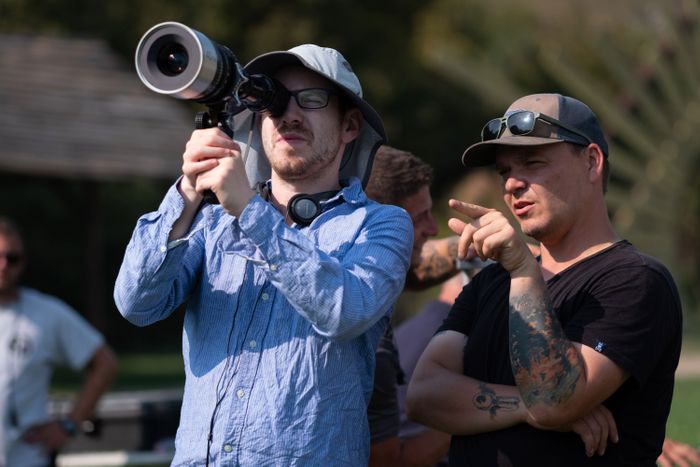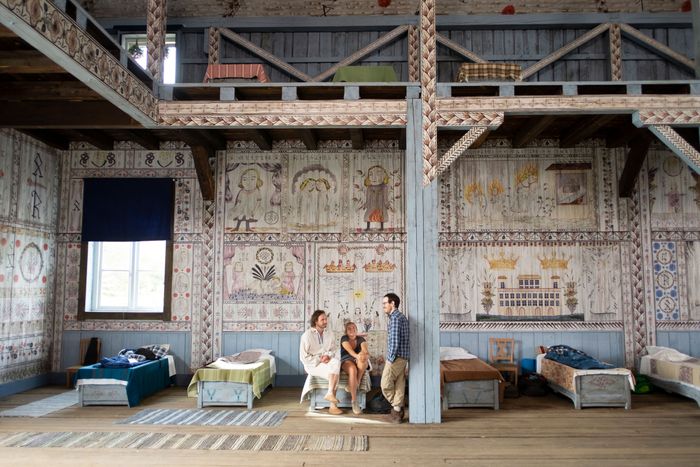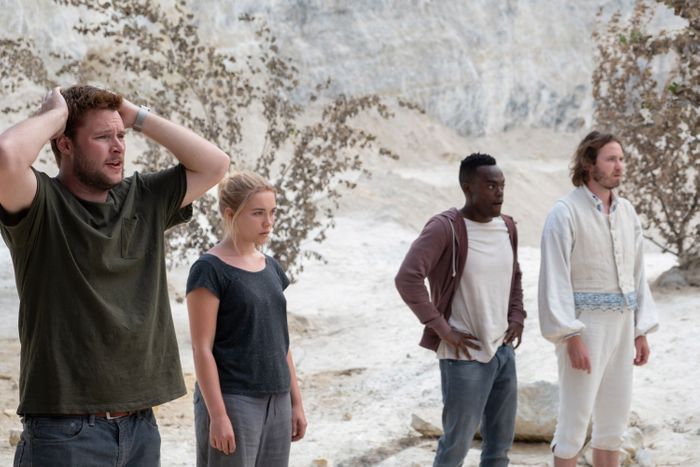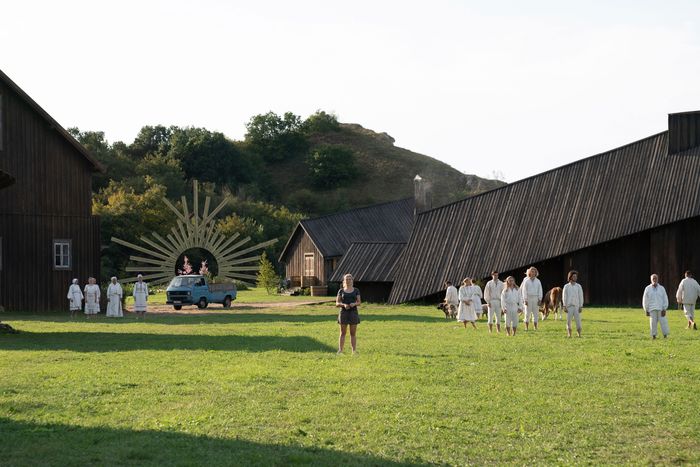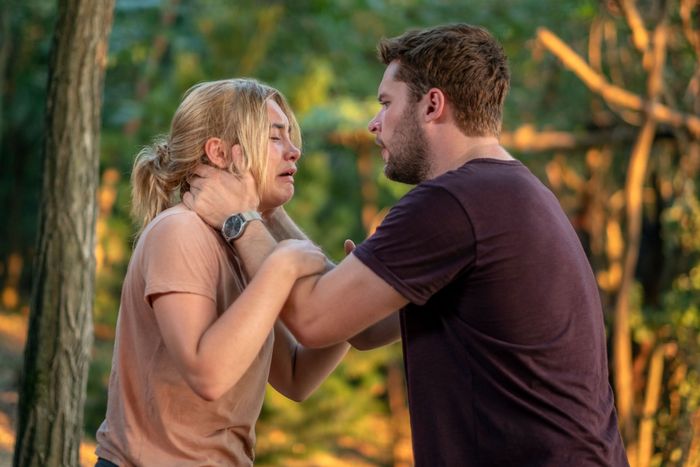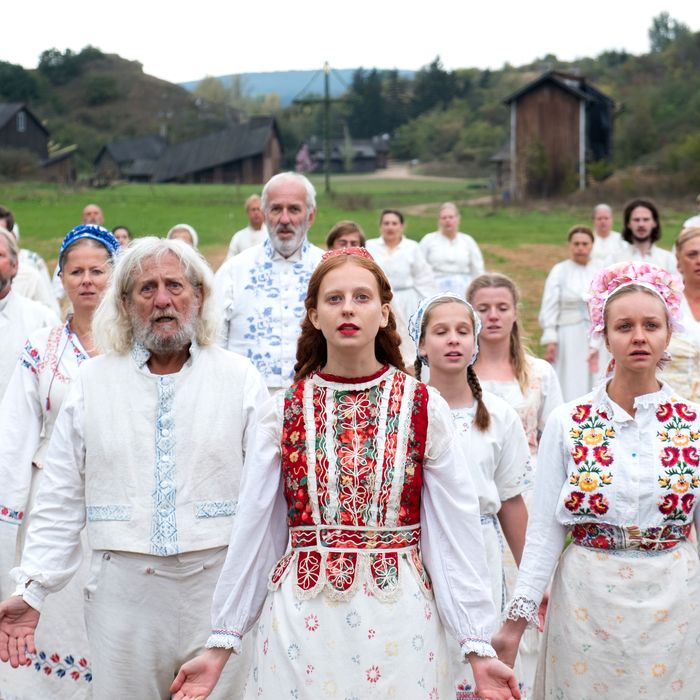
Just over a year ago, on the week that his debut feature, Hereditary, hit theaters — before going on to become A24’s highest-grossing release to date — Ari Aster was in a field in Hungary, getting ready to oversee construction of a Swedish commune. It was part of the set for his follow-up film, Midsommar, which had already been slated for a fall 2019 release (that would eventually get pushed up even earlier to July). The rush order was due to several factors — the need to shoot in summer, lead Florence Pugh’s schedule — but the white-hot festival reception of Hereditary and buzz around Aster in general probably also had something to do with it. Aster often talks about the two films as if they are one continuous experience, and from where he’s sitting, it’s easy to understand why.
But if the experience of making Midsommar felt like a rush, the resulting film doesn’t betray that at all. Midsommar, which follows a grieving young woman (Pugh) who goes to a “traditional festival” in Sweden with a boyfriend she should probably dump (Jack Reynor) and his buddies, patiently builds up its psychedelically baroque breakup story until every underlying emotion is magnified and warped and festooned in blood and flowers. It’s also surprisingly funny, not to mention a very realistic portrayal of what it’s like to go on a group vacation that nobody wants you on. Aster wrote the script in the midst of a breakup himself, off of an assignment to create a Hostel-like pick-’em-off horror film. If this is Aster’s version of torture porn, its torture is as psychological as it is visceral — and ultimately, somehow, cathartic.
When I sat down with Aster at the A24 office in New York, I started off by somewhat jokingly asking Aster about his “process,” because it’s hard to imagine a busier filmmaker over the past year and a half. Aster, hours away from hopping on a plane to L.A. and armed with not one but two cold-pressed juices on the conference table, gamely took me up on it, recounting the particularly intense days of overlap between his debut and follow-up features. He also spoke about using horror to communicate his own personal anxieties, and the surreality of going from “despairing of ever making something” to having two under his belt. If it sounds like he’s complaining, it should be noted that Aster is a disarmingly affable, gracious interview. At the same time, the way he talks about filmmaking (both “a horribly prolonged grieving process” and a “nightmare-survival situation”) bears more than a passing resemblance to his own films.
It seems hard to overstate how intense your working schedule has been for the past couple of years, especially with the overlap of Midsommar and Hereditary’s productions. How did you transition from one to the other, if at all? What was that timeline like?
I’ve been working nonstop for two and a half years. Two and a half years ago, preproduction began on Hereditary. So while I was finishing Hereditary — while I was doing visual effects and music and working on the sound design — I had to finish up so I could dive into the shot list for Midsommar, because that was getting greenlit. We knew that we had to shoot that summer, because it’s a summer movie, and Hereditary was slated to come out June 8. So I was working on the [Midsommar] shot list, because the way that I have worked thus far, is that I shot-list the whole movie so I see the film as clearly as possible. That’s before I would talk to my cinematographer, before I talk to my production designer, and I have to do that before we can scout locations, because I need to know what the geography of this village is, which we’re about to build from scratch. So I had to find a field where we can build this village and I need to know where each house is in relation to each other, and this is all while I’m still finishing Hereditary.
So I did that, and then we went to Sweden. I realized we couldn’t afford to make this film in Sweden, so we decided to shoot in Hungary. We were scouting for a long time to find the right field, and I was also still desperately working on the shot list, because the scouting is pretty useless [without it.] I got through three-fourths of the shot list and we found a village that worked for the movie. Then we had two months to build everything, and we had to begin shooting at the beginning of August, otherwise we couldn’t make this movie that year, we’d have to make it the next year. I came back [to the states], I did like three weeks of press for Hereditary while the production machine was beginning in Hungary. But my head was not in it.
I can imagine.
Until it was, and then my head was not in the movie anymore. I got back to Hungary, and we’re running out of time before preproduction begins. Meanwhile, I’m hearing that Hereditary is doing really well. “Okay, great. I don’t care. I’ve got to figure this out. I’m drowning.”
Would you say you never really got to appreciate Hereditary’s success?
I did not experience it. It was like an abstract concept that I hadn’t accepted. Like, “Okay. It did well? Great, I don’t know what that means.” It was my first film, but I was already so far away from it.
Obviously, A24 knew that Hereditary was special, and it was something that really worked for them. And it behooved them to make another movie with you, ideally sooner rather than later. But from the outside — and maybe it feels different from where you’re sitting, or if you’re aware of other similar situations — but it certainly feels like you’ve been put on a fast track that not very many filmmakers in the indie world get put on.
I can’t speak to other filmmakers or, like, what their schedules are. But I can’t imagine a more intense schedule than what I just went through. And I have been told by people at A24 and by members of the postproduction crew that they’ve never been on a movie this intensely squeezed.
But I definitely also feel extremely fortunate to be in this position. Two and a half years ago, I was not. Two and a half years ago, I was despairing of ever making something. And I had spent 10 years trying to make something and making shorts over and over and writing a feature, trying to get it going. And while I’m trying to get it going, I go, ”I guess I’ll write another one. I guess I’ll write another one.” Until I had like 11 scripts. So it is surreal to be in this position. It’s crazy that it’s been so fast.
People told me before [that making a film] feels like it takes forever and then when it happens it goes way too fast. Then I experienced it and it was like, “Oh shit, that’s true.” For so long it was the Sisyphean task of getting a movie made and then it became this like Sisyphean task of making it right now. And so I haven’t processed the Hereditary experience, and I guess I’ll have an opportunity to process the Midsommar experience. It feels like they’re both kind of clumped together.
Midsommar was an assignment from a Swedish production company. How did you balance the prefab concept with all the personal stuff you eventually brought to it?
I had never before written anything for hire and I can’t really imagine myself doing it again. But this was about four years ago, and the producers came to me with a broad idea for this folk-horror movie about American tourists going to Sweden and them being killed off during Midsummer. And the comps were like, Hostel. They had read the script for Hereditary and they basically came to me saying, “We’d love for you to do what you did with Hereditary with this concept.” My first instinct was to pass on it, because it’s not necessarily a subgenre that I felt compelled to work in. But I was going through a breakup at the time, and I wanted to write a breakup movie.
So as an exercise, I sat with the idea and I said, “Okay, is there a way to, like, take the money and find a way to smuggle a breakup movie into this?” And for me, the way in was: for the guys in the movie, this is a folk-horror movie, but for the protagonist — for Dani, who I was kind of making a surrogate for myself — it’s a wish-fulfillment fantasy, it’s like a fairy tale.
And that’s what got me excited, the idea of making kind of a throwaway folk-horror movie, where all the things that people are there for, they’re going to get, but it’s almost peripheral. You go to those movies and the interest is usually like … “Okay, these people are going to be sacrificed. How are they going to be sacrificed? How grotesque is it going to be? How fucked up are the deaths going to be?” Which for me, is not particularly interesting. So I guess the first agreement I made with myself was, “I’m going to get there, but en route there will be, I hope, something else.”
You surely take some kind of pleasure in writing fucked-up deaths. You’ve made two films in a row now where the deaths are some of the most visceral, memorable aspects of the film.
I guess, for me, it’s always the setup that’s the most exciting. So all the [deaths] feel like second-act stuff, in a way. And the second act is only as good as what you’ve built in the first act, which is maybe a very clinical way of talking about it. But, yes, it is fun playing with the grotesque. That was always exciting for me. When I was thinking about what would be fun in that respect, I was thinking less about other movies than I was about certain artists — like, Joel-Peter Witkin came to mind. But without spoiling anything, what excited me about what we were doing was how we get to what happens [at the end of the film], and how that should feel. It’s not rational that that should be cathartic, but it should be. I hope it is.
So you have all these grotesque, psychedelic centerpieces that start mounting in the second half of the film. But the opening ten minutes of the film are on another plane entirely from everything that happens in Sweden, and to my mind, the most horrifying part of the film. You have a knack for that kind of domestic horror as well. Is that a different act of imagination for you? Where does that kind of domestic horror come from?
In the context of the film, I needed something that was bad enough, that was traumatic enough, to hang over the whole film. And that was necessary because I wanted to make this big operatic breakup movie where the breakup itself is not that special. He’s not the worst guy in the world. And she’s very needy. But she’s needy because she’s navigating this unfathomable situation. And that’s important because of where the film ends. You start with the unfathomable and you end with the unfathomable.
But I think for me, it’s also … I love the horror genre, but there are a lot of movies that I want to make that are not in the horror genre. It’s kind of funny that I started there, because that wasn’t meant to be the path. I had three movies that I wanted to make before this that I thought I’d be making first, before Hereditary. And this is in no way to discount the genre. I love the genre, but I’m a very neurotic guy. I’m hypochondriacal. I’m somebody who, I’m in a crisis until I resolve it, and then I replace it with a new one. And I usually write in crisis. So for me, writing these films has been therapeutic because all of a sudden I can take out my anxieties and my worst-case scenario imagination on these characters and watch them navigate it, as opposed to navigating it to no end in my own life.
Right, well it’s something you can do with genre films. If you have a character who’s depressed, people want to know why. Which, of course, is not how depression or anxiety work in real life. But in horror you can embody that feeling in a scenario that you can point to and say, “that’s what she feels like, and that’s why she feels that way.”
I think that’s a very good point. Like, to be able to kind of lay out what these feelings are like for people. If you make a movie about a woman lying in bed, not able to get up because the chemicals in her head are preventing her from doing so, it’s maybe not the most effective way of [depicting that]. There are other ways of doing it. Like Jeanne Dielman is brilliant at telling you what this woman’s life is and why it’s suffocating. Films like The Seventh Continent by Michael Haneke. You’re watching something that you see every day, but you’re seeing it with this horrible clarity because of the way the filmmaker has laid it out.
And I don’t think I’m even fully conscious of trying to do something like that. But if anything, I’m a child of melodrama. I grew up loving melodrama and anything operatic. I love the idea of having the movie be as big as the feelings that the characters are feeling. And that’s certainly what I was trying to do with Hereditary. Which is like, these people feel like they’re cursed, because that’s what it feels like when horrible things happen. And so what is the feeling of being cursed?
So then it becomes a horror movie almost as a side effect, because just by trying to channel what that feeling is you have to reach into these extremes.
Exactly. Like, what is the horror of existing? That is a feeling I know and I think everybody knows it, and I think we spend a lot of time pushing it away. I think most of us are very successful at surviving the feeling while also having it be a low hum that’s underneath everything, that if you just stay busy enough, you can keep it in the background.
Not that you would know anything about that. Well, I’m afraid to ask about what you’re going to do next — I certainly hope that you’re planning on taking a break.
I’m kind of afraid to. It’s become my norm. I mean, I’m going to have to because there are a couple of scripts that I’m thinking about right now that I’ve already written. One is a big domestic melodrama, one is an absurdist dark comedy. I don’t know which one I want to do, but I’ll probably make the decision in the next month. Then I’ll work on polishing that script and start thinking about what to do with it and how to get it going.
I’m in a very lucky position, which I have been in with the last two films. Hopefully I’ll be able to make a third. But I’m a little nervous about the idea of stopping. I’ve been dreading it, because I haven’t in so long. And so I guess, the way it’ll probably look is that I will stop and I’ll have days to myself and I’ll be thinking about the next one and getting ready to eject myself out of any sort of normal life. But it’s been weird. I really don’t know what I’ve done. I don’t know what it is.
You don’t know what the movie is?
Well, it’s just you get so close to a film, and you’re so close to all the decisions you’re making. All these small decisions and you get to the end and it’s like … What are the broad strokes that I was even intending?
I feel like I’ve talked about this with filmmakers a lot. There’s some kind of tragedy in filmmaking where you’ll never get to see your movie, really. You’ll never get to see the thing that you wanted to make. If you’re lucky, then maybe everybody else will. But you’ll never get to have the experience of walking into a theater and watching your movie with a clean slate like that.
Well the other tragedy is that nobody will see the movie that you had in your head. And so for me — I’ve been saying this a lot recently — but making films for me is just like this horribly prolonged grieving process of having to make compromises. Sometimes they’re small, sometimes they’re huge. In shooting, you’re racing. Like, if you get stuck on one shot, then you’re compromising all the other shots you could do that day. So you can get it as close to perfect as you can. And then some shots you have to move on and you didn’t get it the way you wanted. And that’s a tiny tragedy, and then you carry that weight to the next one.
And so, all of a sudden, instead of being excited about the next shot, you feel doomed. And then it becomes this thing where it’s like, “Okay, I need to be happy with the next shot because I need that energy to take to the next one.” Because I am running low on morale. And so, it gets to the point where you just are begging, to whatever higher power is up there, to just give you something to be proud of by the end of the day. It’s rough because this is a dream come true. I’m so lucky to be doing this. But it’s so exhausting that you forget to appreciate it immediately. So you’re being dragged through this thing that you’ve always wanted. And then at the end, it’s like you regret not being more present for it. So you go and do it again and then you realize there is no being [present]. It is survival. It goes from this dreamlike situation to this nightmare-survival situation. And you have got to find some way to mediate between the two.


